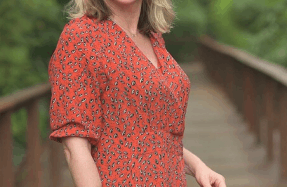Who Killed Jill Dando? This documentary on the death of the adored presenter is flawless

There is an eerie moment in Who Killed Jill Dando? when Barry George re-enacts how he didn’t shoot dead the popular BBC Crimewatch presenter on her west London doorstep in April 1999.
George’s large frame, in a dark suit, towers behind executive producer Emma Cooper. She agreed to take part in the impromptu demonstration, but is now nervously folding her arms. You feel her discomfort – understandably. George was originally convicted of broadcaster Dando’s murder in 2001 and imprisoned for eight years, before later being acquitted at a retrial. He is now a free man living in Ireland. The case remains unsolved.
Intent on proving his point, George gesticulates: “If I pushed you down, you’re facing your door, putting the keys in your door. If I had pushed you down, and it is alleged I pushed you down with my left hand, there’d be masses of blood or gunshot residue over the perpetrator. They found one particle, right. I rest my case.”
He does – but do we? In what appears to be a never-ending supply of real crime documentaries, Who Killed Jill Dando? stands out for its forensic re-examination of probably the biggest and most high-profile murder investigation in British policing history. Filmmaker Marcus Plowright, known for Fred and Rose West: Reopened, and Cooper, who worked on The Disappearance of Madeleine McCann, have produced a flawless piece of work which is both a sensitive and balanced portrait of Dando’s life and a fast-paced investigation of her death; put together, it’s the Happy Valley of true crime documentaries.
Jill Dando was killed aged 37 outside her Fulham home with a single shot to the head in an “unfathomable” crime “that was rare in the extreme”, says former detective chief superintendent Hamish Campbell.

Dando, also seen on travel show Holiday and The Antiques Inspectors, was “the golden girl of television” and “second only to Princess Diana in terms of public affection”, we are told. With her classless English accent and polished professionalism, this ex-provincial reporter from The Weston Mercury newspaper had been going places. Viewers see Dando navigate the misogynistic, male-dominated newsroom at Breakfast Time (having been told to lose weight and then restyled by Diana’s Mayfair hairdresser Martyn Maxey) to become a total natural in front of the camera.
Dando’s brother Nigel, friends, other journalists, retired police investigators and lawyers appear on screen to offer a wealth of recollections, spliced with footage and harrowing eyewitness accounts as the fairytale goes dark. We hear the first 999 call from neighbour and friend Helen Doble who discovered the bloodied crime scene and sobs to an operator: “Oh my God, no, I don’t think she’s alive. I’m sorry.” Dando was buried in the same church where she planned to marry fiancé Alan Farthing that September.
But who did it? Statistically, most people are killed by someone they know, so grieving Farthing, Bob Wheaton, her ex-partner and news editor, and agent Jon Roseman were interviewed by police before being ruled out. Roseman had asked Dando to pick up a fax from her home at No. 29 Gowan Avenue on the fateful morning. He also drafted a crime novel about one of his clients being shot dead, but tells the film: “Anyone who suspected I would cut off a financial revenue like Jill Dando will have to be insane.”
There are many other theories. An unknown man of Serbian descent called the BBC claiming she had been executed in a revenge hit for the UK-backed Nato bombing in Belgrade. In this series, an ex-gangster claims underworld figures carried out the assassination for her work on Crimewatch, helping to put villains behind bars.
Who Killed Jill Dando? also builds on Plowright’s shorter 2019 BBC feature in which Barry George erroneously didn’t appear. The broadcaster said at the time a present-day interview with him “was not necessary… to tell the wider context of Jill’s death”. It comes to pass that was a terrible mistake upon which Netfix has capitalised.

George, an “oddball fantasist of the first order”, pretended to be a cousin of Queen frontman Freddie Mercury called Barry Bulsara, claimed he’d worked as a stuntman and had previous convictions for attempted rape, indecent assault and impersonating a police officer. His obsession with Diana led to him once trying to break into Kensington Palace in combat gear armed with two knives and rope. Photos of hundreds of unsuspecting women taken in the street were discovered in undeveloped rolls of film in his ground-floor flat half a mile from Dando’s house.
Former Evening Standard courts correspondent Paul Cheston, who appears here, says George’s appearance, when he went on trial for the murder, remains one of the most memorable of his career. “There was a thirst, a desperation for information which had to emerge from the trial. The road outside the Old Bailey was packed with television crews. It stopped the traffic. It was a massive media occasion.” And yet, George’s barrister Michael Mansfield KC maintains the case against him was flawed, as it relied on traces of firearm residue inside the right-hand pocket of his blue Cecil Gee coat.
Never afraid to ask questions, the series concludes with retired Det Ch Supt Campbell being asked if he had reconsidered whether George actually killed Dando. He replies: “I don’t think I’ve changed my mind”, before adding: “The guilty verdict in 2001 was the correct verdict. People like a mystery but I don’t think it’s a mystery at all.”
A Metropolitan Police spokesman said the Dando investigation remains open, and it will always explore any new information which may become available. Maybe this series will push a little harder at that door.
Who Killed Jill Dando? is out on Netflix from September 28






